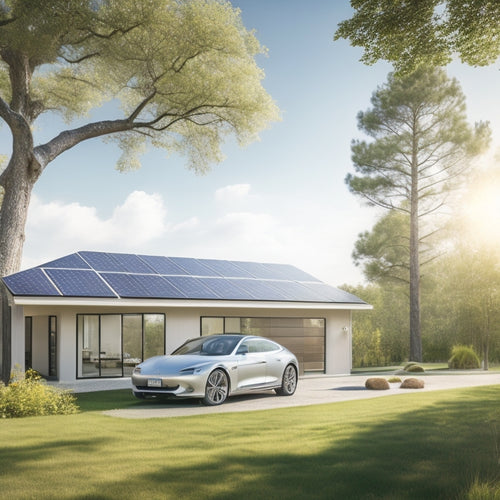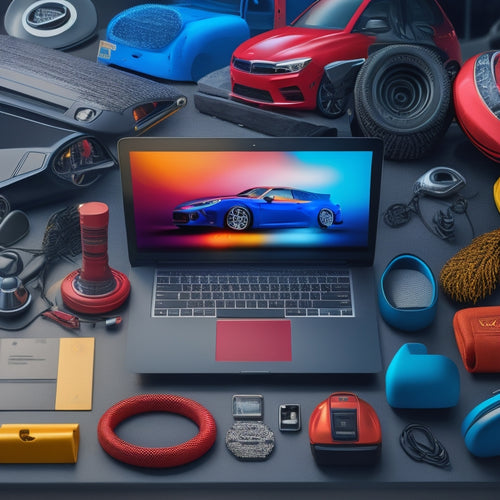
Cheap Home Solar Panel Options for Homes
Share
You can investigate several affordable solar panel options for your home, including brands like Trina, Jinko, and Hanwha Q CELLS that offer budget-friendly panels with varying wattages, efficiencies, and price points. Consider DIY installation, but prioritize safety and proper electrical connections. Used and refurbished panels can also be a cost-effective choice, but be sure to assess their efficiency and warranty. Financing alternatives like solar loans, leasing, and power purchase agreements can help spread the cost, and state and federal incentives like the Solar Investment Tax Credit can greatly lower upfront costs - now it's time to weigh your options and find the best fit for your energy goals and budget.
Key Takeaways
- Consider affordable solar panel brands like Trina, Jinko, and Hanwha Q CELLS for budget-friendly options.
- Explore used and refurbished solar panels with warranties and certifications for lower upfront costs.
- DIY solar panel installation can reduce costs, but prioritize safety and proper installation techniques.
- Financing options like solar loans, leasing, and power purchase agreements can make solar more accessible.
- Utilize state and federal incentives like the Solar Investment Tax Credit and net metering to significantly lower upfront costs.
Affordable Solar Panel Brands
Several top-tier solar panel brands offer affordable options for homeowners looking to shift to renewable energy. You can find budget solar panels from reputable manufacturers like Trina, Jinko, and Hanwha Q CELLS, which provide high-quality products at competitive prices.
These brands offer a range of solar panels with varying wattages, efficiencies, and price points, allowing you to choose the best fit for your budget and energy needs.
When selecting a budget solar panel, consider the overall cost per watt, as well as the panel's efficiency and durability. Look for products with high-efficiency ratings and long-term warranties to guarantee maximum solar energy savings over time.
Additionally, consider the cost of installation, maintenance, and repairs when calculating the total cost of ownership.
DIY Solar Panel Installation
If you're looking to save even more money on your solar panel setup, considering a DIY solar panel installation can be a viable option. However, before you start, make certain you have a solid understanding of solar panel basics, including the electrical connections and mounting requirements.
It's essential to guarantee installation safety, as improper installation can lead to electrical shock, fire hazards, or even roof damage.
Start by evaluating your roof's condition and determining the best solar panel placement. You'll need to calculate the correct angle and orientation for maximum energy output.
Next, gather the necessary tools and materials, including a solar panel kit, mounting hardware, and electrical connectors.
When installing the panels, follow the manufacturer's instructions and take necessary safety precautions, such as wearing protective gear and confirming a secure ladder setup.
Connect the panels to an inverter and a charge controller, and finally, tie the system into your electrical grid.
Remember to inspect your installation regularly to guarantee best performance and safety.
With proper planning and execution, a DIY solar panel installation can be a cost-effective way to utilize renewable energy and reduce your carbon footprint.
Used and Refurbished Options
Your solar panel budget can stretch further by exploring used and refurbished options. These alternatives offer a cost-effective way to utilize solar energy without compromising on performance.
Used solar panels, typically sourced from decommissioned systems or overstocked inventories, can be purchased at a fraction of the original price. Refurbished panels, on the other hand, are restored to their original condition after thorough inspection and repair.
When considering used and refurbished options, keep the following points in mind:
-
Warranty and certification: Confirm the refurbished panels come with a valid warranty and certification from the manufacturer or a reputable third-party organization.
-
Efficiency and performance: Used panels may have lower efficiency rates, affecting their overall performance.
-
Age and degradation: Older panels may have already experienced some degradation, reducing their energy output.
- Installation and maintenance: Consider the additional costs and complexity of installing and maintaining used or refurbished panels.
While used and refurbished options offer significant cost savings, it's crucial to weigh the benefits against potential drawbacks, such as shorter lifespans and reduced performance.
Financing Solar Panel Systems
Exploring financing options is an essential step in utilizing solar energy, as the initial investment can be substantial.
You'll need to evaluate how to fund your solar panel system, and there are several options available. Solar loans are a popular choice, offering a range of terms and interest rates. These loans can be secured through traditional banks, credit unions, or specialized lenders that focus on renewable energy projects.
Leasing options are another alternative, where you pay a monthly fee to use the solar panel system, but don't own it. This approach can provide a lower upfront cost, but you'll need to assess the long-term implications of not owning the system. Some leasing companies also offer power purchase agreements, where you buy the electricity generated by the system at a fixed rate.
When evaluating financing options, consider factors such as interest rates, repayment terms, and the total cost of ownership. By carefully assessing your choices, you can find a financing solution that aligns with your budget and energy goals.
State and Federal Incentives
Beyond financing options, you can further reduce the upfront cost of your solar panel system by taking advantage of state and federal incentives.
These incentives can greatly lower your expenses, making solar energy more accessible and affordable.
To maximize your savings, consider the following state and federal incentives:
-
Federal Solar Investment Tax Credit (ITC): Claim a tax credit of 26% of your total solar panel system cost, which can be claimed on your federal income taxes.
-
State Tax Credits: Many states offer additional tax credits, which can be claimed on top of the federal ITC, further reducing your tax liability.
-
Net Metering: Sell excess energy back to the grid and receive credits on your utility bill, reducing your energy costs and increasing your energy savings.
- State and Local Rebates: Look for rebates and grants offered by your state and local government, which can provide additional funding for your solar panel system.
Frequently Asked Questions
Can I Install Solar Panels on a Rented Property?
A million stars align when you consider installing solar panels on a rented property, but sadly, it's not that simple - you'll face renter restrictions, but don't worry, you can investigate installation alternatives like community solar programs or portable panels.
Do Solar Panels Work During Power Outages?
You'll be glad to know that solar panels can work during power outages, but only if you have a battery backup system, enabling energy storage and ensuring continuous solar panel functionality when the grid goes down.
How Often Should I Clean My Solar Panels?
You'll be shocked if you don't clean your solar panels regularly, as dirt and debris can reduce energy output by up to 25%! For ideal solar panel maintenance, you should clean them every 6-12 months using gentle cleaning techniques to guarantee maximum energy harvest.
Can I Use Solar Panels With a Septic System?
When you're considering solar panels with a septic system, you'll need to prioritize septic system considerations, guaranteeing solar panel placement doesn't compromise the drainfield or disrupt wastewater treatment, and vice versa, to guarantee a harmonious coexistence.
Are Solar Panels Resistant to Hail and Extreme Weather?
You'll be relieved to know that solar panels are designed to withstand harsh weather conditions, including hail damage, thanks to their weather durability features, such as tempered glass and anodized aluminum frames, ensuring your power supply remains uninterrupted.
Related Posts
-

Why Invest in Solar Car Battery Chargers Online?
By investing in a solar car battery charger online, you're not only reducing your reliance on fossil fuels but also o...
-

Top 10 Tips for Buying Car Accessories Online
When purchasing car accessories online, you should take proactive steps to avoid low-quality or incompatible products...
-

10 Tips for Cleaner City Air With Scooters
By adopting a few simple habits, you can make a significant impact on reducing city air pollution with your scooter. ...


